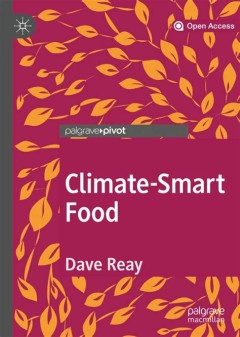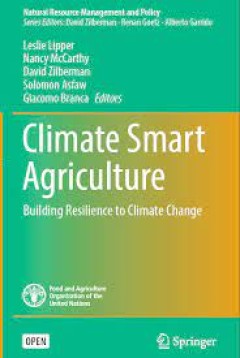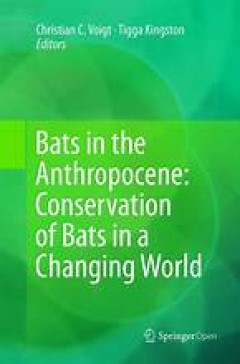Filter by

Climate-Smart Food
This open access book asks just how climate-smart our food really is. It follows an average day's worth of food and drink to see where it comes from, how far it travels, and the carbon price we all pay for it. From our breakfast tea and toast, through breaktime chocolate bar, to take-away supper, Dave Reay explores the weather extremes the world’s farmers are already dealing with, and what ne…
- Edition
- 1
- ISBN/ISSN
- 9783030182069
- Collation
- XIV, 201 hlm; ill., lamp.,
- Series Title
- -
- Call Number
- -

Achieving the Paris Climate Agreement Goals : Global and Regional 100% Renewa…
This open access book presents detailed pathways to achieve 100% renewable energy by 2050, globally and across ten geographical regions. Based on state-of-the-art scenario modelling, it provides the vital missing link between renewable energy targets and the measures needed to achieve them. Bringing together the latest research in climate science, renewable energy technology, employment and res…
- Edition
- 1
- ISBN/ISSN
- 9783030058432
- Collation
- LIX, 491 hlm,: ill, lamp;
- Series Title
- -
- Call Number
- -

Understanding Risks and Uncertainties in Energy and Climate Policy: Multidisc…
This open access book analyzes and seeks to consolidate the use of robust quantitative tools and qualitative methods for the design and assessment of energy and climate policies. In particular, it examines energy and climate policy performance and associated risks, as well as public acceptance and portfolio analysis in climate policy, and presents methods for evaluating the costs and benefits o…
- Edition
- 1
- ISBN/ISSN
- 9783030031527
- Collation
- XVI, 259 hlm,: ill, lamp;
- Series Title
- -
- Call Number
- -

A Practical Guide to Atmospheric Simulation Chambers
This open access title presents atmospheric simulation chambers as effective tools for atmospheric chemistry research. State-of-the-art simulation chambers provide unprecedented opportunities for atmospheric scientists to perform experiments that address the most important questions in air quality and climate research. The book covers technical details about chamber preparation and practical gu…
- Edition
- 1
- ISBN/ISSN
- 978-3-031-22277-1
- Collation
- XII, 339
- Series Title
- -
- Call Number
- -

Climate Smart Agriculture : Building Resilience to Climate Change
The book uses an economic lens to identify the main features of climate-smart agriculture (CSA), its likely impact, and the challenges associated with its implementation. Drawing upon theory and concepts from agricultural development, institutional, and resource economics, this book expands and formalizes the conceptual foundations of CSA. Focusing on the adaptation/resilience dimension of CSA,…
- Edition
- -
- ISBN/ISSN
- 9783319611945
- Collation
- XVIII, 630 halaman
- Series Title
- Natural Resource Management and Policy
- Call Number
- 630 CLI

Bats in the Anthropocene: Conservation of Bats in a Changing World
This book focuses on central themes related to the conservation of bats. It details their response to land-use change and management practices, intensified urbanization and roost disturbance and loss. Increasing interactions between humans and bats as a result of hunting, disease relationships, occupation of human dwellings, and conflict over fruit crops are explored in depth. Finally, contribu…
- Edition
- 1
- ISBN/ISSN
- 978-3-319-25220-9
- Collation
- -
- Series Title
- -
- Call Number
- IX, 606

Perspectives on Public Policy in Societal-Environmental Crises
This is an open access book. Histories we tell never emerge in a vacuum, and history as an academic discipline that studies the past is highly sensitive to the concerns of the present and the heated debates that can divide entire societies. But does the study of the past also have something to teach us about the future? Can history help us in coping with the planetary crisis we are now faci…
- Edition
- -
- ISBN/ISSN
- 978-3-030-94137-6
- Collation
- -
- Series Title
- -
- Call Number
- -

From Decoding Turbulence to Unveiling the Fingerprint of Climate Change
This open access book serves as a reference for the key elements and their significance of Klaus Hasselmann's work on climate science and on ocean wave research, all based on a rigorous and deeply physical thinking. It summarizes the original articles (mostly from the 1970 and 1980s; some of which are hard to find nowadays) and brings them in a present-day context. From 1975 until 2000, he was …
- Edition
- 1
- ISBN/ISSN
- 978-3-030-91716-6
- Collation
- -
- Series Title
- -
- Call Number
- XI, 315

From Decoding Turbulence to Unveiling the Fingerprint of Climate Change
This open access book serves as a reference for the key elements and their significance of Klaus Hasselmann's work on climate science and on ocean wave research, all based on a rigorous and deeply physical thinking. It summarizes the original articles (mostly from the 1970 and 1980s; some of which are hard to find nowadays) and brings them in a present-day context. From 1975 until 2000, he was …
- Edition
- -
- ISBN/ISSN
- 978-3-030-91716-6
- Collation
- -
- Series Title
- -
- Call Number
- -

Energy Transition and Energy Democracy in East Asia
This is an open access book.The subject of this book is to provide down-to-earth information on what kind of actions are being taken by the Government, Local community, Businesses, Researchers, NGOs on the energy transition in this region. It gives an updated picture of the energy transition in the East Asian countries, where the economic growth, as well as CO2 emission growth, is significant. …
- Edition
- -
- ISBN/ISSN
- 978-981-19-0280-2
- Collation
- -
- Series Title
- -
- Call Number
- -
 Computer Science, Information & General Works
Computer Science, Information & General Works  Philosophy & Psychology
Philosophy & Psychology  Religion
Religion  Social Sciences
Social Sciences  Language
Language  Pure Science
Pure Science  Applied Sciences
Applied Sciences  Art & Recreation
Art & Recreation  Literature
Literature  History & Geography
History & Geography